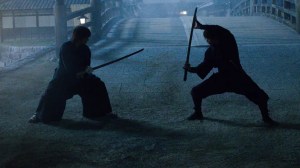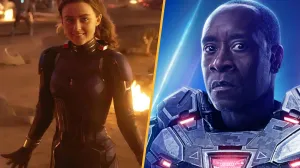Actor Xander Berkeley is no stranger to starring in genre films, with some of his earliest film roles being in Candyman and Terminator 2: Judgment Day, while recent years saw him head to the world of the living undead as Gregory in AMC’s The Walking Dead. Despite the familiarity horror fans might have with the actor, they’ll see him taking on an all-new role for The Dark and the Wicked, which many audiences will arguably find to be the most disturbing project they’ve seen Berkeley in yet. The Dark and the Wicked will be In Theaters, Digital HD, and On Demand on November 6th.
Videos by ComicBook.com
On a secluded farm, a man is slowly dying. Bedridden and fighting through his final breaths, his wife is slowly succumbing to overwhelming grief. To help their mother and say goodbye to their father, siblings Louise (Marin Ireland) and Michael (Michael Abbott Jr.) return to their family farm. It doesn’t take long for them to see that something’s wrong with mom, though — something more than her heavy sorrow. Gradually, as their own grief mounts, Louise and Michael begin suffering from a darkness similar to their mother’s, marked by waking nightmares and a growing sense that something evil is taking over their family.
ComicBook.com recently caught up with Berkeley to talk about his experiences in genre films, the disturbing nature of his new film, and a close encounter he had with a spider on set.

ComicBook.com: You’ve starred in a variety of projects throughout your career in a number of mediums, but looking at your past projects, there are plenty that exist in the world of horror and sci-fi. What do you feel it is about these genres that allows you to tell compelling stories in ways that a traditional drama might not allow?
Xander Berkeley: Well, I’ve sort of stepped delicately around the genre. I was a big fan when I was a kid, but somehow coming into acting when I did, from the theater, being brought out to L.A. when I was really quite young still, the dramas and the comedies were somehow sort of considered acceptable in a way that there was a bit of … that was when the flashier films were first starting to be done and you just wanted to steer clear of the splatter if you were a little baby hippie like I have been, I didn’t want to just go for gratuitous violence. And so the things that I did do that have sci-fi were different. Obviously, it was something like Terminator 2 and Candyman, which I like to consider that smart, art horror, just as I do The Dark and the Wicked.
And the very first movie I did was Mommie Dearest, which wasn’t supposed to be a horror film, but in a way, it became one. It was so over the top, in a way, so camp, and Faye [Dunaway] was so full-on with her Joan Crawford that it almost became like a monster in the way they shot it, and Frank Perry’s whole approach to cinematography and everything, it really went from being a sophisticated, serious studio movie to being a camp horror flick overnight when it opened in the theaters. It always told me that there was a really fun way to sort of guide a career into the A-list of directors that I wanted to be able to work with and learn from, because I still want to direct myself, actually.
It’s like I went to college forever, trying to study with as many great directors as I could and the sci-fi genre and the horror genre have definite overlaps. Terminator 2, early on in my career, I think definitely put me in the sci-fi realm and a lot of ideas for them to play around with, and then The Walking Dead is in that … it’s hard because, God knows those zombies, the Walkers, can be creepy and have brilliant effects. To me, The Dark and the Wicked is right on that line like Candyman was, in a way, between art film and horror, it’s really going into a deep, psychological place rather than anything that’s just meant to be gratuitously disturbing or frightening or gross.
Writer/director Bryan Bertino’s last films, The Strangers and The Monster, have familiar horror structures, but he manages to convey a very specific type of anxiety with his films that set them apart from his contemporaries. As far as learning from directors on set goes, what do you feel you took away from your time working with Bryan on this film?
He’s a very private guy, so you don’t get a lot directly. And I wasn’t there long enough to get … I had a really nice dinner with him and he told me a bit about himself and I really liked the guy a lot. There’s darkness there, but there’s so much thoughtfulness and he just really impressed me with his quiet focus and he, himself, it’s his family’s property there in Texas that we shot on. He really just created an atmosphere and, the cinematographer [Tristan Nyby], they were definitely on the same page of what they wanted and I felt it atmospherically, at the time, which always helps you as an actor.
If you feel like they’ve created a vibe on the set, that’s what they want to see on the screen. It’s just something you just stepped into and become a part of. There was one thing that I’m looking forward to talking to Bryan and asking him whether this limited him in the editing room, he indulged me, at the time, when we were shooting my first scene, where I show up outside in the rain and the truck pulls up and Michael [Abbott] stops to see who this weird guy is at the end of the driveway, and I give him the cross.
There was a spider, a large spider that jumped off the truck onto my hat in the first rehearsal, or maybe it was a master shot. He just stayed up there and he just kept circling around and around my hat brim, dipping well into my view. It was a big-ass spider, but I didn’t knock him off because I read the script and there were so many references to spiders. I just thought this has to be an omen. This is like, this thing is blessing this movie or cursing and I don’t know what he’s doing. That’s something in my mind and I asked Bryan, “Can we leave him on there? Even though it might limit you in terms of cuts?” It’s just something, whether you did it as a subliminal thing that’s going on in Michael’s mind, or whether it’s just something that I’m carrying with me.
I think that it would have been too on the nose and, to cut it out … because it would have ended up reading about it the very next scene. It was clammed up and I don’t think originally in the script, I think there was something in between my arrival and my coming in. I forget exactly how it played in the script that I didn’t realize it was one right after the other. And it would have been too much to then suddenly read from the book and talking about spiders.
But there was still just something to me that said he was brave because a lot of directors would be going, “No, no, no, let’s get that out. It’s not going to match.” But that thing, I mean, even if we used it, even if you used it in some other way, that if there had been some flashback or whatever, that he was willing to go with that, because that thing just stayed in my closeup over the shoulder, onto Michael, the two-shot, that thing was up there and it made a nest at the top of my hat.
I’ve never had that happen before. I would have probably shaken any other spider that dared to land, as large as that was, then loom and dangle down in my view. But that was my first scene and that created such a zone for me. He ended up shooting it over the shoulder and side, clearly cutting around the spider.
So I hurt my performance to a certain level, because it was something really impactful, I think in the closeup of greeting him, but it’s a risk. It’s one that you just feel like, gosh, when I do little movies, not the big, big-budget movies, but smaller-budget movies, one of the reasons I do them, because obviously you’re not doing it for the money, is because you can get into a gorilla stance and use what’s happening around you and sometimes that’s some of the most powerful stuff you ever get to see on film, is things that are really funny. And there’s a dynamic flexibility in an independent, lower-budget film that doesn’t exist in the gargantuan production, with all the money and scheduling and planning that has to be involved. You just can’t risk as much because of the money involved.
But he had everything so mapped out. I just thought it was interesting that he was willing to veer and accept an impulse from both the spider and myself, and then worked with it. And, for me, it really did put me in a trance and then we went on to do the next scene. And then, even though it was the next day, I just really felt like that spider was still creeping around inside me and I used it for the physicality of the character.
*****
The Dark and the Wicked will be In Theaters, Digital HD, and On Demand on November 6th.








